- Home
- Philip Roth
Portnoy's Complaint Page 2
Portnoy's Complaint Read online
Page 2
Because she is good she will pack a lunch for me to take along, but then out I go, in my coat and my galoshes, and what happens is not her business.
Okay, I say, if that’s how you feel! (For I have the taste for melodrama too—I am not in this family for nothing.) I don’t need a bag of lunch! I don’t need anything!
I don’t love you any more, not a little boy who behaves like you do. I’ll live alone here with Daddy and Hannah, says my mother (a master really at phrasing things just the right way to kill you). Hannah can set up the mahjongg tiles for the ladies on Tuesday night. We won’t be needing you any more.
Who cares! And out the door I go, into the long dim hallway. Who cares! I will sell newspapers on the streets in my bare feet. I will ride where I want on freight cars and sleep in open fields, I think—and then it is enough for me to see the empty milk bottles standing by our welcome mat, for the immensity of all I have lost to come breaking over my head. “I hate you!” I holler, kicking a galosh at the door; “you stink!” To this filth, to this heresy booming through the corridors of the apartment building where she is vying with twenty other Jewish women to be the patron saint of self-sacrifice, my mother has no choice but to throw the double-lock on our door. This is when I start to hammer to be let in. I drop to the doormat to beg forgiveness for my sin (which is what again?) and promise her nothing but perfection for the rest of our lives, which at that time I believe will be endless.
Then there are the nights I will not eat. My sister, who is four years my senior, assures me that what I remember is fact: I would refuse to eat, and my mother would find herself unable to submit to such willfulness—and such idiocy. And unable to for my own good. She is only asking me to do something for my own good—and still I say no? Wouldn’t she give me the food out of her own mouth, don’t I know that by now?
But I don’t want the food from her mouth. I don’t even want the food from my plate—that’s the point.
Please! a child with my potential! my accomplishments! my future!—all the gifts God has lavished upon me, of beauty, of brains, am I to be allowed to think I can just starve myself to death for no good reason in the world?
Do I want people to look down on a skinny little boy all my life, or to look up to a man?
Do I want to be pushed around and made fun of, do I want to be skin and bones that people can knock over with a sneeze, or do I want to command respect?
Which do I want to be when I grow up, weak or strong, a success or a failure, a man or a mouse?
I just don’t want to eat, I answer.
So my mother sits down in a chair beside me with a long bread knife in her hand. It is made of stainless steel, and has little sawlike teeth. Which do I want to be, weak or strong, a man or a mouse?
Doctor, why, why oh why oh why oh why does a mother pull a knife on her own son? I am six, seven years old, how do I know she really wouldn’t use it? What am I supposed to do, try bluffing her out, at seven? I have no complicated sense of strategy, for Christ’s sake—I probably don’t even weigh sixty pounds yet! Someone waves a knife in my direction, I believe there is an intention lurking somewhere to draw my blood! Only why? What can she possibly be thinking in her brain? How crazy can she possibly be? Suppose she had let me win—what would have been lost? Why a knife, why the threat of murder, why is such total and annihilating victory necessary—when only the day before she set down her iron on the ironing board and applauded as I stormed around the kitchen rehearsing my role as Christopher Columbus in the third-grade production of Land Ho! I am the star actor of my class, they cannot put a play on without me. Oh, once they tried, when I had my bronchitis, but my teacher later confided in my mother that it had been decidedly second-rate. Oh how, how can she spend such glorious afternoons in that kitchen, polishing silver, chopping liver, threading new elastic in the waistband of my little jockey shorts—and feeding me all the while my cues from the mimeographed script, playing Queen Isabella to my Columbus, Betsy Ross to my Washington, Mrs. Pasteur to my Louis—how can she rise with me on the crest of my genius during those dusky beautiful hours after school, and then at night, because I will not eat some string beans and a baked potato, point a bread knife at my heart?
And why doesn’t my father stop her?
WHACKING OFF
Then came adolescence—half my waking life spent locked behind the bathroom door, firing my wad down the toilet bowl, or into the soiled clothes in the laundry hamper, or splat, up against the medicine-chest mirror, before which I stood in my dropped drawers so I could see how it looked coming out. Or else I was doubled over my flying fist, eyes pressed closed but mouth wide open, to take that sticky sauce of buttermilk and Clorox on my own tongue and teeth—though not infrequently, in my blindness and ecstasy, I got it all in the pompadour, like a blast of Wildroot Cream Oil. Through a world of matted handkerchiefs and crumpled Kleenex and stained pajamas, I moved my raw and swollen penis, perpetually in dread that my loathsomeness would be discovered by someone stealing upon me just as I was in the frenzy of dropping my load. Nevertheless, I was wholly incapable of keeping my paws from my dong once it started the climb up my belly. In the middle of a class I would raise a hand to be excused, rush down the corridor to the lavatory, and with ten or fifteen savage strokes, beat off standing up into a urinal. At the Saturday afternoon movie I would leave my friends to go off to the candy machine—and wind up in a distant balcony seat, squirting my seed into the empty wrapper from a Mounds bar. On an outing of our family association, I once cored an apple, saw to my astonishment (and with the aid of my obsession) what it looked like, and ran off into the woods to fall upon the orifice of the fruit, pretending that the cool and mealy hole was actually between the legs of that mythical being who always called me Big Boy when she pleaded for what no girl in all recorded history had ever had. “Oh shove it in me, Big Boy,” cried the cored apple that I banged silly on that picnic. “Big Boy, Big Boy, oh give me all you’ve got,” begged the empty milk bottle that I kept hidden in our storage bin in the basement, to drive wild after school with my vaselined upright. “Come, Big Boy, come,” screamed the maddened piece of liver that, in my own insanity, I bought one afternoon at a butcher shop and, believe it or not, violated behind a billboard on the way to a bar mitzvah lesson.
It was at the end of my freshman year of high school—and freshman year of masturbating—that I discovered on the underside of my penis, just where the shaft meets the head, a little discolored dot that has since been diagnosed as a freckle. Cancer. I had given myself cancer. All that pulling and tugging at my own flesh, all that friction, had given me an incurable disease. And not yet fourteen! In bed at night the tears rolled from my eyes. “No!” I sobbed. “I don’t want to die! Please—no!” But then, because I would very shortly be a corpse anyway, I went ahead as usual and jerked off into my sock. I had taken to carrying the dirty socks into bed with me at night so as to be able to use one as a receptacle upon retiring, and the other upon awakening.
If only I could cut down to one hand-job a day, or hold the line at two, or even three! But with the prospect of oblivion before me, I actually began to set new records for myself. Before meals. After meals. During meals. Jumping up from the dinner table, I tragically clutch at my belly—diarrhea! I cry, I have been stricken with diarrhea!—and once behind the locked bathroom door, slip over my head a pair of underpants that I have stolen from my sister’s dresser and carry rolled in a handkerchief in my pocket. So galvanic is the effect of cotton panties against my mouth—so galvanic is the word “panties”—that the trajectory of my ejaculation reaches startling new heights: leaving my joint like a rocket it makes right for the light bulb overhead, where to my wonderment and horror, it hits and it hangs. Wildly in the first moment I cover my head, expecting an explosion of glass, a burst of flames—disaster, you see, is never far from my mind. Then quietly as I can I climb the radiator and remove the sizzling gob with a wad of toilet paper. I begin a scrupulous search of the shower curtain, the t
ub, the tile floor, the four toothbrushes—God forbid!—and just as I am about to unlock the door, imagining I have covered my tracks, my heart lurches at the sight of what is hanging like snot to the toe of my shoe. I am the Raskolnikov of jerking off—the sticky evidence is everywhere! Is it on my cuffs too? in my hair? my ear? All this I wonder even as I come back to the kitchen table, scowling and cranky, to grumble self-right-eously at my father when he opens his mouth full of red jello and says, “I don’t understand what you have to lock the door about. That to me is beyond comprehension. What is this, a home or a Grand Central station?” “… privacy … a human being … around here never,” I reply, then push aside my dessert to scream, “I don’t feel well—will everybody leave me alone?”
After dessert—which I finish because I happen to like jello, even if I detest them—after dessert I am back in the bathroom again. I burrow through the week’s laundry until I uncover one of my sister’s soiled brassieres. I string one shoulder strap over the knob of the bathroom door and the other on the knob of the linen closet: a scarecrow to bring on more dreams. “Oh beat it, Big Boy, beat it to a red-hot pulp—” so I am being urged by the little cups of Hannah’s brassiere, when a rolled-up newspaper smacks at the door. And sends me and my handful an inch off the toilet seat. “—Come on, give somebody else a crack at that bowl, will you?” my father says. “I haven’t moved my bowels in a week.”
I recover my equilibrium, as is my talent, with a burst of hurt feelings. “I have a terrible case of diarrhea! Doesn’t that mean anything to anyone in this house?”—in the meantime resuming the stroke, indeed quickening the tempo as my cancerous organ miraculously begins to quiver again from the inside out.
Then Hannah’s brassiere begins to move. To swing to and fro! I veil my eyes, and behold!—Lenore Lapidus! who has the biggest pair in my class, running for the bus after school, her great untouchable load shifting weightily inside her blouse, oh I urge them up from their cups, and over, LENORE LAPIDUS’S ACTUAL TITS, and realize in the same split second that my mother is vigorously shaking the doorknob. Of the door I have finally forgotten to lock! I knew it would happen one day! Caught! As good as dead!
“Open up, Alex. I want you to open up this instant.”
It’s locked, I’m not caught! And I see from what’s alive in my hand that I’m not quite dead yet either. Beat on then! beat on! “Lick me, Big Boy—lick me a good hot lick! I’m Lenore Lapidus’s big fat red-hot brassiere!”
“Alex, I want an answer from you. Did you eat French fries after school? Is that why you’re sick like this?”
“Nuhhh, nuhhh.”
“Alex, are you in pain? Do you want me to call the doctor? Are you in pain, or aren’t you? I want to know exactly where it hurts. Answer me.”
“Yuhh, yuhhh—”
“Alex, I don’t want you to flush the toilet,” says my mother sternly. “I want to see what you’ve done in there. I don’t like the sound of this at all.”
“And me,” says my father, touched as he always was by my accomplishments—as much awe as envy—“I haven’t moved my bowels in a week,” just as I lurch from my perch on the toilet seat, and with the whimper of a whipped animal, deliver three drops of something barely viscous into the tiny piece of cloth where my flat-chested eighteen-year-old sister has laid her nipples, such as they are. It is my fourth orgasm of the day. When will I begin to come blood?
“Get in here, please, you,” says my mother. “Why did you flush the toilet when I told you not to?”
“I forgot.”
“What was in there that you were so fast to flush it?”
“Diarrhea.”
“Was it mostly liquid or was it mostly poopie?”
“I don’t look! I didn’t look! Stop saying poopie to me—I’m in high school!”
“Oh, don’t you shout at me, Alex. I’m not the one who gave you diarrhea, I assure you. If all you ate was what you were fed at home, you wouldn’t be running to the bathroom fifty times a day. Hannah tells me what you’re doing, so don’t think I don’t know.”
She’s missed the underpants! I’ve been caught! Oh, let me be dead! I’d just as soon!
“Yeah, what do I do …?”
“You go to Harold’s Hot Dog and Chazerai Palace after school and you eat French fries with Melvin Weiner. Don’t you? Don’t lie to me either. Do you or do you not stuff yourself with French fries and ketchup on Hawthorne Avenue after school? Jack, come in here, I want you to hear this,” she calls to my father, now occupying the bathroom.
“Look, I’m trying to move my bowels,” he replies. “Don’t I have enough trouble as it is without people screaming at me when I’m trying to move my bowels?”
“You know what your son does after school, the A student, who his own mother can’t say poopie to any more, he’s such a grown-up? What do you think your grown-up son does when nobody is watching him?”
“Can I please be left alone, please?” cries my father. “Can I have a little peace, please, so I can get something accomplished in here?”
“Just wait till your father hears what you do, in defiance of every health habit there could possibly be. Alex, answer me something. You’re so smart, you know all the answers now, answer me this: how do you think Melvin Weiner gave himself colitis? Why has that child spent half his life in hospitals?”
“Because he eats chazerai.”
“Don’t you dare make fun of me!”
“All right,” I scream, “how did he get colitis?”
“Because he eats chazerai! But it’s not a joke! Because to him a meal is an O Henry bar washed down by a bottle of Pepsi. Because his breakfast consists of, do you know what? The most important meal of the day—not according just to your mother, Alex, but according to the highest nutritionists—and do you know what that child eats?”
“A doughnut.”
“A doughnut is right, Mr. Smart Guy, Mr. Adult. And coffee. Coffee and a doughnut, and on this a thirteen-year-old pisher with half a stomach is supposed to start a day. But you, thank God, have been brought up differently. You don’t have a mother who gallavants all over town like some names I could name, from Barn’s to Hahne’s to Kresge’s all day long. Alex, tell me, so it’s not a mystery, or maybe I’m just stupid—only tell me, what are you trying to do, what are you trying to prove, that you should stuff yourself with such junk when you could come home to a poppyseed cookie and a nice glass of milk? I want the truth from you. I wouldn’t tell your father,” she says, her voice dropping significantly, “but I must have the truth from you.” Pause. Also significant. “Is it just French fries, darling, or is it more? … Tell me, please, what other kind of garbage you’re putting into your mouth so we can get to the bottom of this diarrhea! I want a straight answer from you, Alex. Are you eating hamburgers out? Answer me, please, is that why you flushed the toilet—was there hamburger in it?”
“I told you—I don’t look in the bowl when I flush it! I’m not interested like you are in other people’s poopie!”
“Oh, oh, oh—thirteen years old and the mouth on him! To someone who is asking a question about his health, his welfare!” The utter incomprehensibility of the situation causes her eyes to become heavy with tears. “Alex, why are you getting like this, give me some clue? Tell me please what horrible things we have done to you all our lives that this should be our reward?” I believe the question strikes her as original. I believe she considers the question unanswerable. And worst of all, so do I. What have they done for me all their lives, but sacrifice? Yet that this is precisely the horrible thing is beyond my understanding—and still, Doctor! To this day!
I brace myself now for the whispering. I can spot the whispering coming a mile away. We are about to discuss my father’s headaches.
“Alex, he didn’t have a headache on him today that he could hardly see straight from it?” She checks, is he out of earshot? God forbid he should hear how critical his condition is, he might claim exaggeration. “He’s not going next week for
a test for a tumor?”
“He is?”
“‘Bring him in,’ the doctor said, ‘I’m going to give him a test for a tumor.’”
Success. I am crying. There is no good reason for me to be crying, but in this household everybody tries to get a good cry in at least once a day. My father, you must understand—as doubtless you do: blackmailers account for a substantial part of the human community, and, I would imagine, of your clientele—my father has been “going” for this tumor test for nearly as long as I can remember. Why his head aches him all the time is, of course, because he is constipated all the time—why he is constipated is because ownership of his intestinal tract is in the hands of the firm of Worry, Fear & Frustration. It is true that a doctor once said to my mother that he would give her husband a test for a tumor—if that would make her happy, is I believe the way that he worded it; he suggested that it would be cheaper, however, and probably more effective for the man to invest in an enema bag. Yet, that I know all this to be so, does not make it any less heartbreaking to imagine my father’s skull splitting open from a malignancy.
Yes, she has me where she wants me, and she knows it. I clean forget my own cancer in the grief that comes—comes now as it came then—when I think how much of life has always been (as he himself very accurately puts it) beyond his comprehension. And his grasp. No money, no schooling, no language, no learning, curiosity without culture, drive without opportunity, experience without wisdom … How easily his inadequacies can move me to tears. As easily as they move me to anger!
A person my father often held up to me as someone to emulate in life was the theatrical producer Billy Rose. Walter Winchell said that Billy Rose’s knowledge of shorthand had led Bernard Baruch to hire him as a secretary—consequently my father plagued me throughout high school to enroll in the shorthand course. “Alex, where would Billy Rose be today without his shorthand? Nowhere! So why do you fight me?” Earlier it was the piano we battled over. For a man whose house was without a phonograph or a record, he was passionate on the subject of a musical instrument. “I don’t understand why you won’t take a musical instrument, this is beyond comprehension. Your little cousin Toby can sit down at the piano and play whatever song you can name. All she has to do is sit at the piano and play ‘Tea for Two’ and everybody in the room is her friend. She’ll never lack for companionship, Alex, she’ll never lack for popularity. Only tell me you’ll take up the piano, and I’ll have one in here tomorrow morning. Alex, are you listening to me? I am offering you something that could change the rest of your life!”

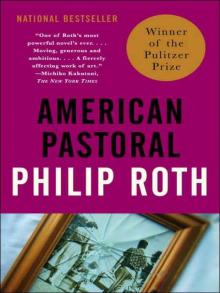 American Pastoral
American Pastoral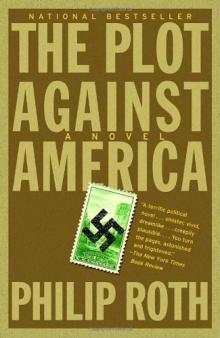 The plot against America
The plot against America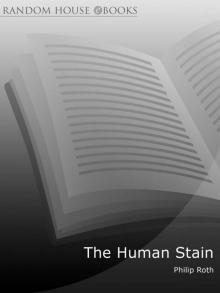 The Human Stain
The Human Stain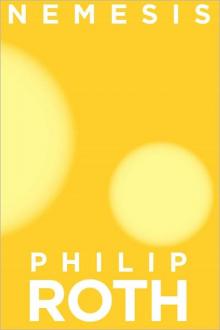 Nemesis n-4
Nemesis n-4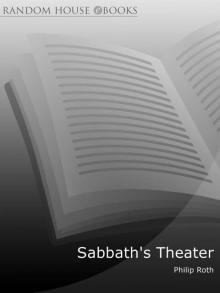 Sabbath’s Theater
Sabbath’s Theater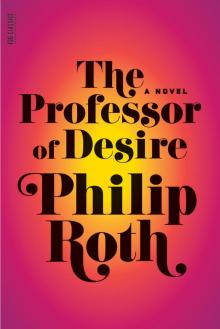 The Professor of Desire
The Professor of Desire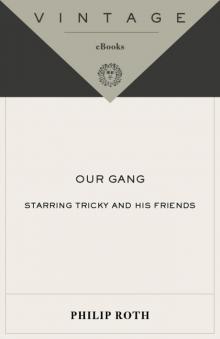 Our Gang
Our Gang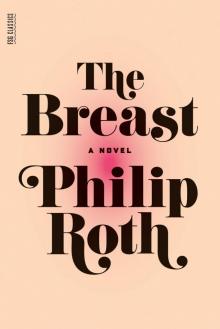 The Breast
The Breast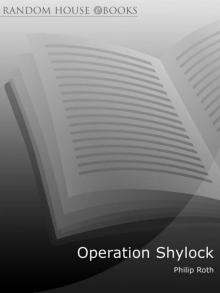 Operation Shylock
Operation Shylock The Dying Animal
The Dying Animal Letting Go
Letting Go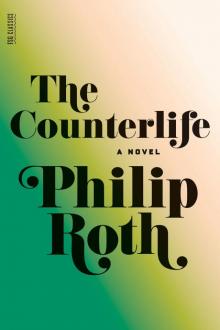 The Counterlife
The Counterlife Everyman
Everyman Nemesis
Nemesis Exit Ghost
Exit Ghost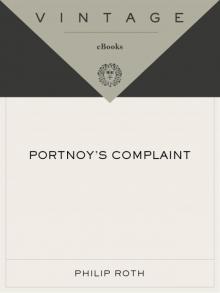 Portnoy's Complaint
Portnoy's Complaint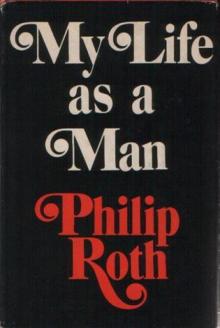 My Life as a Man
My Life as a Man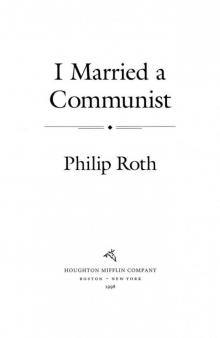 I Married a Communist
I Married a Communist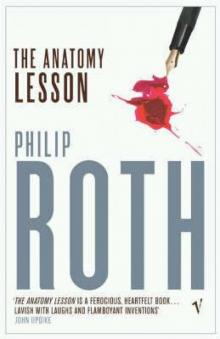 The Anatomy Lesson
The Anatomy Lesson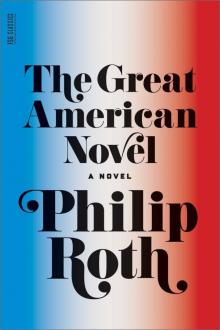 The Great American Novel
The Great American Novel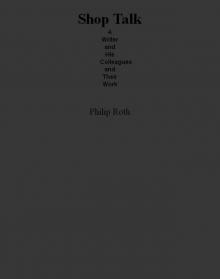 Shop Talk
Shop Talk The Humbling
The Humbling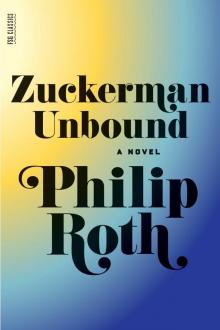 Zuckerman Unbound
Zuckerman Unbound When She Was Good
When She Was Good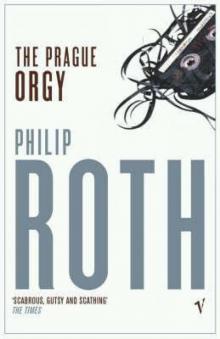 The Prague Orgy
The Prague Orgy American Pastoral (Nathan Zuckerman)
American Pastoral (Nathan Zuckerman) Goodbye, Columbus
Goodbye, Columbus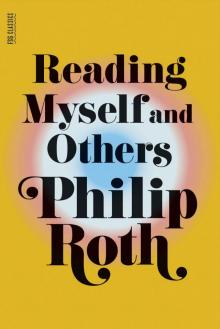 Reading Myself and Others
Reading Myself and Others